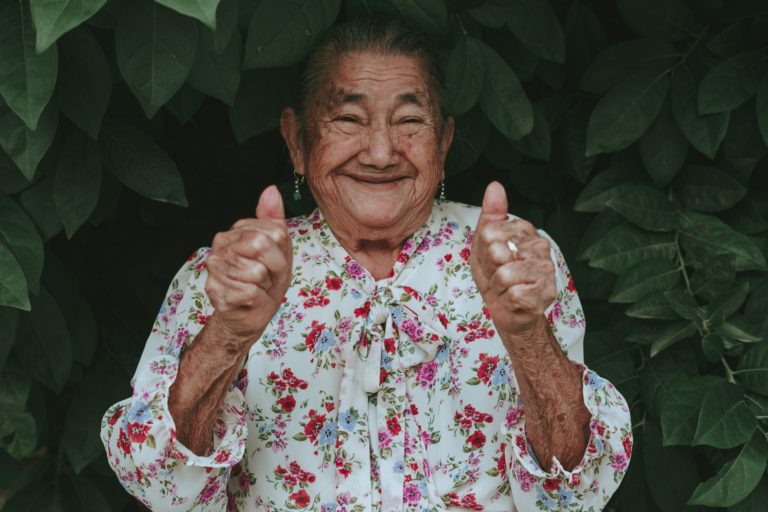
Tricia Despres is a freelance writer in the Chicago area. Her work has been published in the Chicago Sun-Times, People, American Songwriter and other publications.
On the day Bernadine Walsh turned 50 years old, the spitfire with the sassy sense of humor joined a dance troupe. For her 60th birthday, she bought herself a bike. At 70, she started taking piano lessons. When she turned 80, she threw herself a Roaring ’20s birthday party. Walsh ended up having so much fun at that party that she decided to throw another one 10 years later, at 90.
That’s just the kind of woman Walsh, who lives in Elmhurst, is.
“I just always thought it was a healthy thing to do to join something and interact with people and learn something new to prevent boredom,” the 91-year-old, stage 4 cancer survivor says. “I just want to keep out of that ol’ rocking chair for as long as possible.”
In her voice, you can hear an energy and a drive that seems to point to someone far younger than her age. So, did Walsh just get lucky to live as long as she has? Or is there something we can all do to be granted the same fate?
“Well, everyone asks if there is a magic pill or something, but unfortunately there is not,” says Magdalena Bednarczyk, MD, a geriatric specialist at Rush University Medical Center. “Ultimately, it’s a combination of different factors that will have the biggest impact on longevity.”
The number of Americans age 100 and older — called centenarians — continues to increase, rising from 50,281 in 2000 to 72,197 in 2014, according to the Centers for Disease Control and Prevention. Estimates were for that number to reach 90,000 in 2020.
Although many strive for longevity, there’s no set recipe for a long and happy life; however, good genes, a healthy lifestyle, and a positive outlook may help.
Factors for longevity
“Rule number one is to pick long lived, healthy parents,” says longevity expert S. Jay Olshansky, PhD, a professor of public health at the University of Illinois at Chicago. “There is no way you can make it to these older ages healthy and intact without winning the genetic lottery at birth. It’s just not possible. You can’t transform someone who is destined to die in their 50s or 60s or 70s into someone who can make it into their late 80s or 90s. We can’t manufacture survival time that well. Even if you have the genetic potential to live that long, you still have to maintain your physical and mental functioning.”
And doing that in the midst of a pandemic can have its challenges.
During the first half of 2020, the average U.S. life expectancy dropped by one whole year, according to a report from the National Center for Health Statistics. Currently, the life expectancy for a male living in the United States is 75 years of age, while the life expectancy for a female is 81 years of age.
But make no mistake, there are things that you can do today that might very well have a direct effect on what happens during all of your tomorrows. Everything from diet to exercise to weight control to good sleep directly impacts longevity.
“You have to look at longevity from a lifetime perspective,” Bednarczyk says, adding that she is seeing more patients dealing with health issues such as diabetes, obesity, and cardiovascular disease at a younger age than ever before. “Individuals diagnosed at an earlier age with multiple chronic conditions that have not been well controlled through medications and lifestyle interventions are at risk for having a shorter life span as a consequence.”
Unfortunately, the chances of dealing with some sort of chronic medical disease during your lifetime can come down to something as simple as where you live.
In Chicago, life expectancies vary greatly depending on the neighborhood you live in. People in predominantly white wealthy downtown areas have a life expectancy of up to 90, while people in South Side and West Side predominantly Black communities can only expect to live into their 60s, according to 2015 data from the City Health Dashboard.
“Unfortunately, the differences in age and mortality often comes down to one’s zip code,” Bednarczyk says. “You can live in Streeterville and live to be 90 years old. And then, you can have someone living in Englewood, just nine miles away, and they might only live to be 60 years old. The socioeconomic conditions in certain areas of Chicago can basically accelerate aging.”
Lifestyle choices
It’s no wonder some feel out of control when it comes to longevity. But no need to despair.
“It all comes down to what you can control and what you cannot,” Olshansky says. “If you have the genetic potential to live a long life, you still have to maintain your physical and mental functioning.”
Areas of the world called Blue Zones have some of the longest-living people. There, people enjoy longevity accompanied by good quality of life. People tend to stay connected to and supported by others, eat a predominantly plant-based diet, and find ways to shed stress and maintain a positive outlook.
“We already know that social isolation and depression have a negative impact on one’s overall health. Mental health issues, such as depression and anxiety are as important to treat as high blood pressure or diabetes” Bednarczyk says. “So, we suggest to all of our older patients that they continue to come from a place of gratitude when they can, to focus on the positive aspects of their life. Building a supportive social network and community for support can often result in better health outcomes and longevity.”
In addition, take the stairs instead of the elevator. Park farther away from the grocery store and walk the extra distance. Take a mental timeout when you need it, and try to increase your fitness level. And if all else fails, take a lesson from Ms. Bernadine Walsh.
“My goal has always been to pursue love and respect rather than money and fame,” she laughs, before she heads out to meet some newly vaccinated friends for lunch. “All I have ever wanted was a happy life, and that’s what I have.”








